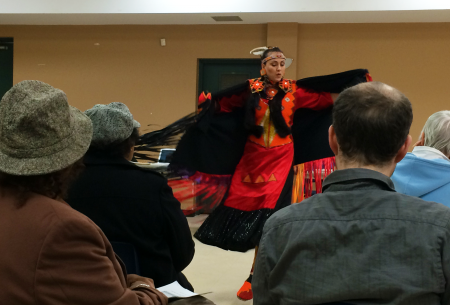What happened to Africville half a century ago is happening again, racialized communities in Nova Scotia are reporting as part of a new research project.
Prior to forcibly relocating the African-Nova Scotian suburb in the 1960s, the City of Halifax surrounded the community with repulsive industrial structures including an infectious disease hospital, an open dump and a slaughterhouse, after these were rejected by white Halifax neighbourhoods.
Today, five racialized communities across NS are saying they experience similar environmental racism, according to a near-complete research project, “In Whose Backyard?”, unveiled Saturday at the Halifax Forum.
About 60 African Nova Scotians, members of Mi’kmaq communities and a handful of allies attended the workshop on environmental injustice.
It was the fifth in a series of community-driven research workshops across the province aiming to gather information from racialized communities.
Researcher Ingrid Waldron presented some of the findings from communities including Lincolnville, North Preston, East Preston, Acadia First Nation, Membertou, Eskasoni and HRM.
Residents in Lincolnville likened their community to Africville. Community members reported high rates of cancer and diabetes. They told researchers their water was contaminated from a first-generation landfill. They were worried about toxins in the soil due to a second-generation landfill that opened in 2006 on the same site. (The Dominion covered the community’s fight against the landfill that year.)
In central Nova Scotia, North Preston and East Preston, residents reported contaminated water and air pollution. They also reported high rates of cancer, diabetes, heart disease, asthma and skin problems. A toxic waste dump sits near a community centre, and wind turbines may soon arrive in the area.
The Yarmouth Reserve was built on a former dump, resulting in contaminated soil, Waldron’s research found. The junkyard was once a dumping ground for car parts. Residents reported diesel fluid dumped in an area of the Yarmouth Reserve and arsenic in the water on the Gold River Reserve. The community experiences high rates of cancer, allergies and asthma.
On the Membertou and Eskasoni reserves in Cape Breton, residents believe chemicals in the water produce in toxins in their food. The bay and the fish that swim there are contaminated due to pulp waste from industry, and diesel, paint and paint thinner run through the sewer system, residents said.
The Cape Breton communities surveyed reported high rates of cancer, diabetes, high blood pressure, asthma and learning disabilities, including autism.
The research team is especially interested in a possible link between landfills and illness, as well as the detriments of the poverty cycle in the communities surveyed, Waldron said.
“Environmental racism as a tool to destroy our communities has been around for a very, very long time,” Irvine Carvery, who grew up in Africville, said during the presentation.
African descendants have been subjected to environmental racism since they arrived in NS, he said.
“No matter where we find ourselves in the Western Hemisphere, we find that environmental racism is a tool that is being used against us.”
Mi’kmaq elder Alan Knockwood, who also addressed the group, said his community was tired of governments locating garbage next to their drinking water.
“We’re tired of being the dump,” he said.



